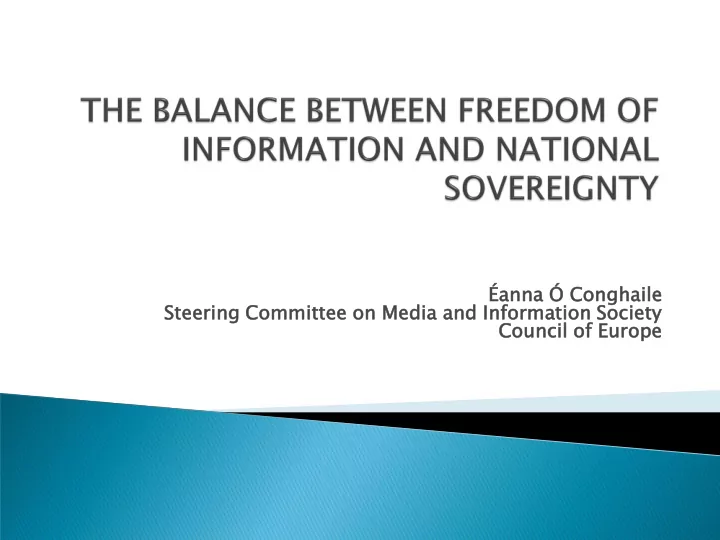

Éanna na Ó Congha haile ile Steeri ring ng Committ ittee ee on Media and Inform rmat ation ion Society ty Council ncil of Europ ope
Everyone has the right to freedom of expression. This right shall include freedom to hold opinions and to receive and impart information and ideas without interference by public authority and regardless of frontiers. This Article shall not prevent States from requiring the licensing of broadcasting, television or cinema enterprises.
1.1. No harm 1.1.1. States have the responsibility to ensure, in compliance with the standards recognised in international human rights law and with the principles of international law, that their actions do not have an adverse transboundary impact on access to and use of the Internet. 1.1.2. This should include, in particular, the responsibility to ensure that their actions within their jurisdictions do not illegitimately interfere with access to content outside their territorial boundaries or negatively impact the transboundary flow of Internet traffic. 1.2. Co-operation States should co-operate in good faith with each other and with relevant stakeholders at all stages of development and implementation of Internet-related public policies to avoid any adverse transboundary impact on access to and use of the Internet. 1.3. Due diligence Within the limits of non-involvement in day-to-day technical and operational matters, states should, in co-operation with each other and with all relevant stakeholders, take all necessary measures to prevent, manage and respond to significant transboundary disruptions to, and interferences with, the infrastructure of the Internet, or, in any event, to minimise the risk and consequences arising from such events.
2. The exercise of these freedoms, since it carries with it duties and responsibilities, may be subject to such formalities, conditions, restrictions or penalties as are prescribed by law and are necessary in a democratic society, in the interests of national security, territorial integrity or public safety, for the prevention of disorder or crime, for the protection of health or morals, for the protection of the reputation or rights of others, for preventing the disclosure of information received in confidence, or for maintaining the authority and impartiality of the judiciary.
Any restrictions must be prescribed by the law of the relevant member State; They must be aimed at meeting a legitimate objective relating to human rights; They must be necessary in a democratic society and on the basis of a pressing social need; and They must be proportionate.
3 …… .Direct or indirect political influence or pressure on new media actors may lead to interference with the exercise of freedom of expression, access to information and transparency, not only at a national level but, given their global reach, also in a broader international context. Decisions concerning content can also impinge on the right to freedom of assembly and association. 6. Interference with content that is released into the public domain .... should be judged against international standards designed to secure the protection of freedom of expression and the right to impart and receive information, in particular the provisions of Article 10 of the Convention and the related case law of the European Court of Human Rights. Furthermore, impediments to interactions of specific interest communities should be measured against international standards on the right to freedom of assembly and association, in particular the provisions of Article 11 of the Convention and the related case law of the European Court of Human Rights.
Recommend
More recommend